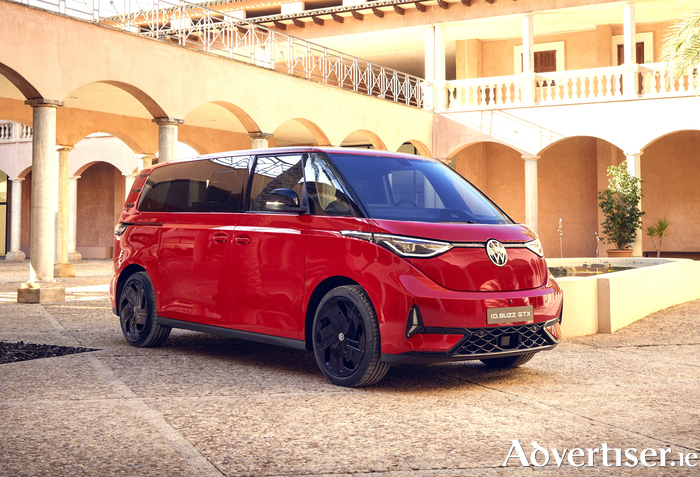Fresh from unveiling the new ID.3 GTX and ID.7 GTX, Volkswagen has now revealed "the most powerful Bulli of all time" in the form of the ID. Buzz GTX. 'Bulli' is German slang for a van which may carry passengers and freight.
The ID Buzz GTX has a new 79kWh battery on board with standard wheelbase, while the extended wheelbase (plus 250 mm ) version is powered by an also new 86 kWh battery.
According to Volkswagen Commercial Vehicles, both GTX models will come with 4MOTION all-wheel drive as standard. They can sprint from 0 to 100 km/h in just 6.5 seconds thanks to an output of 250 kW (340 PS ).
It will be available to order this summer with first deliveries scheduled for Ireland in Q4. Pricing will be announced in the coming weeks.
The new ID. Buzz GTX is equipped with two electric drive motors; 80 kW motor drives the front axle, while a 210 kW motor powers the rear axle – together they form the all-wheel drive. Top speed is electronically limited to 160 km/h.
The electric drive motors in the ID. Buzz GTX are supplied with energy by means of a 79 kWh or 86 kWh battery. VW says the 79 kWh battery can be charged at DC quick-charging stations with up to 185 kW. At maximum charging capacity, it is charged from 10 to 80 per cent again in around 26 minutes; the 86-kWh battery absorbs energy with up to 200 kW at DC quick-charging stations. It is also charged from 10 to 80 per cent in about 26 minutes at maximum charging capacity.
Thanks to an extra 100 kW (136 PS ) of power and the 4MOTION drive system, VW says the ID. Buzz GTX offers a higher maximum trailer weight: the version with normal wheelbase can pull up to 1,800 kg, while the ID. Buzz GTX with long wheelbase has a maximum towing capacity of 1,600 kg. The maximum trailer weight was thus increased by 800 kg and 600 kg respectively.
VW states that dark tones underline the sporty character of the most powerful ID. Buzz. For example, both ID. Buzz GTX versions are the only models in the product line to be equipped with a black headliner. The seats also feature the specific GTX design.
Electrically adjustable comfort seats with memory function are used in the front. The seats are enhanced by covers in black ArtVelours Eco microfleece with a new diamond pattern as well as red contrasting seams and red piping. Red cross-stitching is a distinctive feature on the multifunction steering wheel, which is refined by a red application on the centre trim and the GTX lettering integrated there in chrome.
The ID. Buzz GTX with standard wheelbase is available as a five-seater with a 40:60 split three-seat bench in the second row (2/3 ) or as a six-seater with two individual seats each in the second and third rows (2/2/2 ).
The long-wheelbase ID. Buzz GTX will also launch as a five-seater with a three-seat bench (2/3 ) and as a six-seater (2/2/2 ). This version will additionally be offered as a seven-seater with a three-seat bench in the second row and two individual seats in the third row (2/3/2 ). Depending on the model, the seats in the second row can be moved longitudinally by 150 mm (standard wheelbase ) or 200 mm (long wheelbase ).
The luggage compartment volume of the ID. Buzz GTX (standard wheelbase ) as a five-seater is between 1,121 litres (loaded to the upper edge of the rear seat backrests ) and 2,123 litres (rear bench seat folded down, loaded up to the upper edge of the front seat backrests ).
The extended ID. Buzz GTX is said to be even more spacious: when loaded up to the upper edge of the backrests of the second row of seats, a capacity of 1,340 litres is available. If the large ID. Buzz GTX is loaded right up to the first row of seats, the volume increases to 2,469 litres. Even when occupied by seven people, there is still 306 litres of load space available behind the third row of seats in the long GTX.
Depending on the seat configuration, both ID. Buzz GTX models can be equipped with a long or short Multiflex board (including two folding boxes ). The Multiflex board creates a second loading level and – when the rear seats are folded down – a flat load area.

